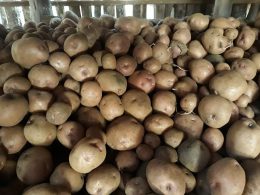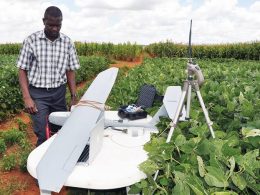By Mark Kawalya
Scientists with Uganda’s National Agricultural Advisory Research Organization (NARO) have developed products that can deter aflatoxin contamination in grains by more than 80%.
The organization’s director general, Dr. Ambrose Agona, says that the products, NARO Aflatoxin Binder and Aflasafe, are able to make Uganda’s grains safe for consumption. Aflasafe, for instance, is a cost-effective and easy-to-use product that can reduce aflatoxin contamination by more than 80% in pre-harvest.
Aflasafe technology is also being validated in farmers’ fields to produce data for its official registration before commercialization. The exercise, conducted by NARO and the International Institute of Tropical Agriculture (IITA), began in 2020 and has resulted in the reduction of aflatoxin levels in maize, groundnuts, and sorghum by over 85%.
“I believe that the success of the technology has also been in enhancing awareness about aflatoxins and their management, increasing capability for frequent testing, and giving a premium price to quality grain that meets trade and health standards,” said Agona.
Aflatoxin Binder, on the other hand, contains natural aluminosilicate clays obtained from the Albertine Graben region of Uganda. The product binds toxins from contaminated animal feed, preventing them from entering the animal’s bloodstream and getting assimilated into animal products and tissues.
So far, fortification of aflatoxin-contaminated feeds with NARO’s product at the rate of 1% has been scientifically proven to efficiently boost feed intake, growth rate, and immunity to important diseases like Newcastle in poultry. It can also prevent the carryover of aflatoxins into animal products, thus reducing the potential exposure of consumers to the health risks associated with aflatoxins.
The NARO scientists say that there are other control measures for aflatoxin contamination, such as cultural practices, biological control, host resistance, monitoring, crop production, grain drying, sorting, storage, post-harvest processing, and dietary interventions, among others.
The Ugandan government has been funding research towards aflatoxin control and management, which has led to the development of the Aflasafe solution. NARO has prioritised research on food and feed safety and built capacity for aflatoxin research and testing for routine analysis of samples. Agona says that there is no cause for alarm about Ugandan maize given the grain standards and policy frameworks in place to ensure the safety of grain in the market. Currently, the country has 180 modern silos of different sizes for the safe storage of grains.








